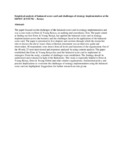| dc.contributor.author | Awino, Zachary Bolo | |
| dc.contributor.author | Mulu, Anne Kanini | |
| dc.date.accessioned | 2013-02-13T12:52:08Z | |
| dc.date.available | 2013-02-13T12:52:08Z | |
| dc.date.issued | 2011 | |
| dc.identifier.citation | DBA Africa management review: 2011, Vol 1 No 1, Pp 60-78 | en |
| dc.identifier.uri | http://erepository.uonbi.ac.ke:8080/xmlui/handle/123456789/9785 | |
| dc.description.abstract | The paper focused on the challenges of the balanced score card in strategy implementation
and was a case study on Ernst & Young-Kenya, an auditing and consultancy firm. The paper
aimed at finding out how Ernst & Young-Kenya, has applied the balanced score card in
strategy implementation across the business and the challenges faced in the application of the
balanced score card. The paper is presented in five chapters and sections through which the
researcher tries to discuss the above issues. Data collection instrument was an interview guide
and observation. 40 respondents were drawn from all levels and functions of the organization.
Out of the 40 only 25 were interviewed and responses analysed by using content analysis. The
paper established that Ernst & Young-Kenya has used the balanced score card to implement
its strategies. From the study, a number of challenges were established. The findings should be
understood and evaluated in light of the limitations. This study is especially helpful to Ernst &
Young-Kenya, Ernst & Young Global and other similar organizations. Institutional policy
and practice implications to overcome the challenges of strategy implementation using the
balanced score card are highlighted. Suggestions for further research are also given. | en |
| dc.language.iso | en | en |
| dc.subject | Balanced Score Card | en |
| dc.subject | Strategy Implementation | en |
| dc.title | Empirical analysis of balanced score card and challenges of strategy implementation at the ERNST &YOUNG – Kenya | en |
| dc.type | Article | en |
| local.publisher | School of Business | en |

